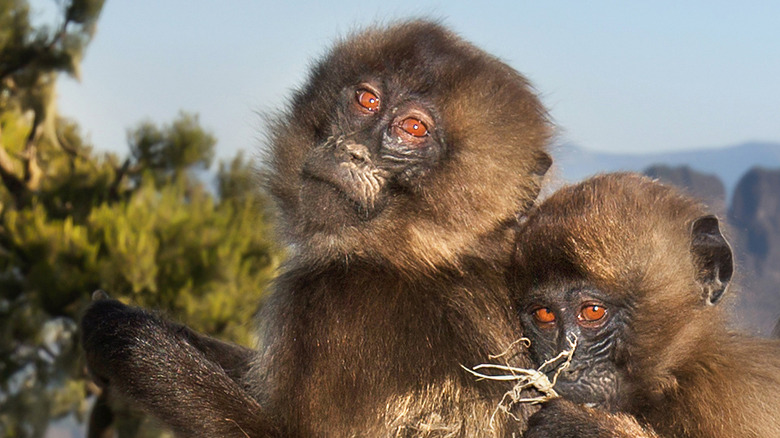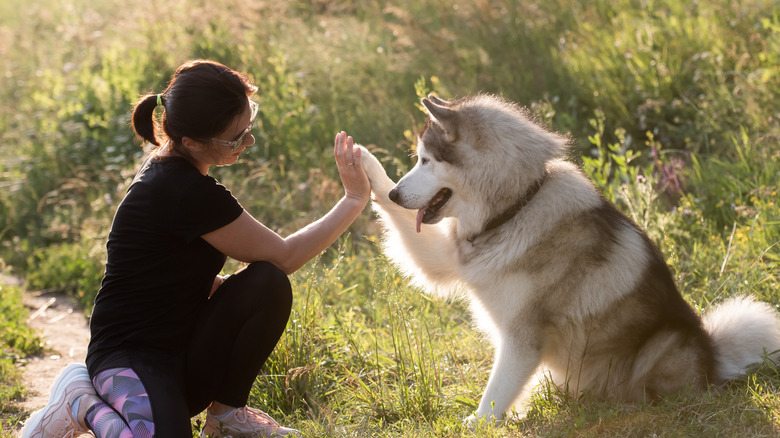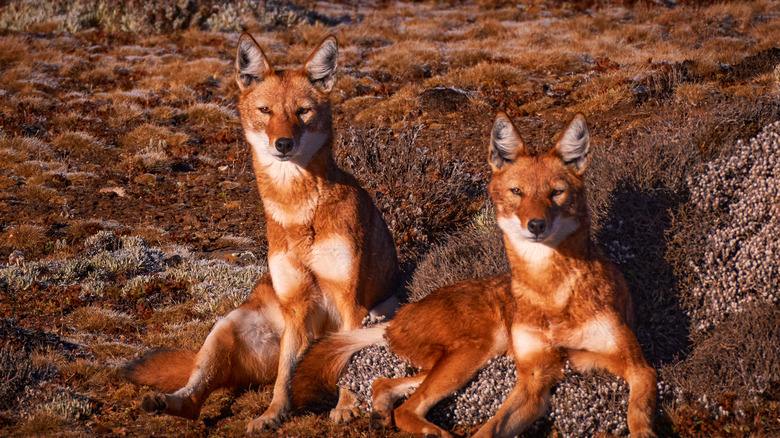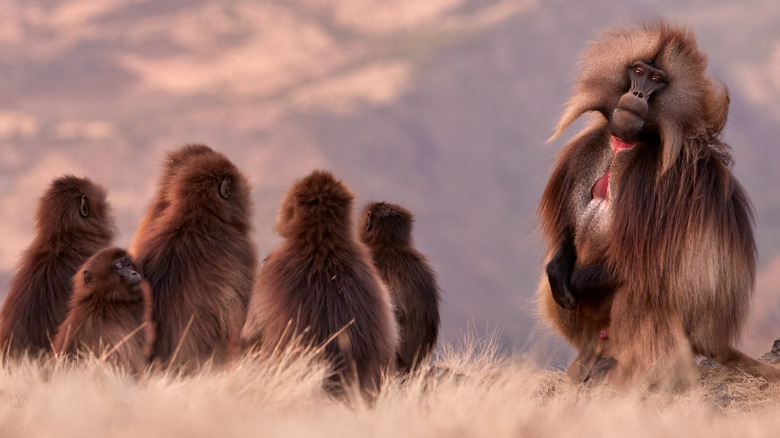Are Monkeys Starting To Domesticate Wolves?
The gelada is a unique monkey in more ways than one. These primates, which live in the mountains and grasslands of Ethiopia (via the African Wildlife Foundation), are known for their very particular diet. Unlike other monkeys, geladas eat mainly grasses. Almost their entire diet is composed of plants they pluck from the ground (via the African Wildlife Foundation Blog).
Like many other primates, geladas don't necessarily follow the structure of the nuclear family. You can sometimes see geladas traveling in herd-like packs reminiscent of other grazers (via the San Diego Zoo Wildlife Alliance Library). These herds, containing hundreds of monkeys, are sub-grouped into smaller family units, each of which has multiple adult females and a single adult male (via the San Diego Zoo).
But perhaps the most interesting feature about the gelada: Some evidence suggests that, like humans did many millennia ago, these primates may be starting to develop cooperative relationships with nearby Ethiopian wolves. Some scientists have speculated that the animals' interactions represent the beginning of the domestication process (via Insider).
How humans domesticated wolves
While the vast majority of people know that dogs were domesticated from wolves, there's a surprisingly hot debate about when and why this happened, according to The Atlantic. Certainly, scientists agree that the process began thousands of years ago, but as to whether the process started in Europe or Asia, academics are still on the fence.
Scientists do have a decent idea, though, about how domestication might have happened. The thought goes that humans, after having carried out massive hunts — like, say, a hunt of a woolly mammoth – had lots of bones and scraps left over (via Science Focus). Wolves, sniffing out the meat, would have come closer to steal a snack, and eventually ingratiated themselves to the humans. Over time, the less aggressive dogs would have been favored by the soft-hearted humans, leading to the gradual domestication of wolves (via ASPCA).
A key thing to understand about domestication is that it was good for both species involved. Wolves got a few easy meals out of the deal, and in return, they may have served as guard dogs warning humans about potential dangers, according to ASPCA.
Evidence that geladas are domesticating wolves
If you thought humans were alone in our ability to domesticate animals, think again. Research suggests that the gelada monkey may also have a semi-cooperative relationship with wolves — in this case, with Ethiopian wolves (via ZME Science). Scientists observing the geladas found that, when the monkeys were grazing in herds, wolves occasionally darted through their midst. This wasn't intended to be intimidating — the wolves weren't on the prowl for primates. They left their monkey companions more or less entirely alone, according to Insider, and instead the wolves spent their time hunting rodents.
According to scientists, wolves seem to have a higher rate of success on rodent hunts when hanging around monkeys. When lingering near the gelada herd, wolves were around 2.5 times more likely to get a kill than when they hunted solo (via Scientific American). This might be because wolves can hide among the monkeys, meaning rodents have a harder time spotting the predators, ZME Science notes. Whatever the reason, for the endangered Ethiopian wolf species, these higher success rates can provide some much-needed help securing their food supply.
What geladas get out of the deal
From the monkey's perspective, the situation is a little more complicated. It's true that monkeys don't seem to be very intimidated by the wolves' presence, according to ZME Science. When wolves approach geladas as prey, the monkeys chase them off, according to Insider, and remember to deny them access to the herd in the future.
But geladas don't necessarily benefit from the wolves' presence in the same way that the monkeys benefit the wolves. Just compare the situation to human-wolf domestication. Sure, humans offered wolves some food, but wolves also might have been used as a sort of early detection tool, helping humans spot threats in the night and find prey while out hunting (via National Geographic). But seeing as geladas mainly subsist off grass, they're not exactly in need of a pet to bring them back a fresh kill. And there's no evidence that wolves help protect geladas in any way (via Insider).
Only future research will truly show what the relationship between geladas and wolves offers to the monkeys. Likewise, time will tell if there will ever be a true domestication relationship between the animals.



